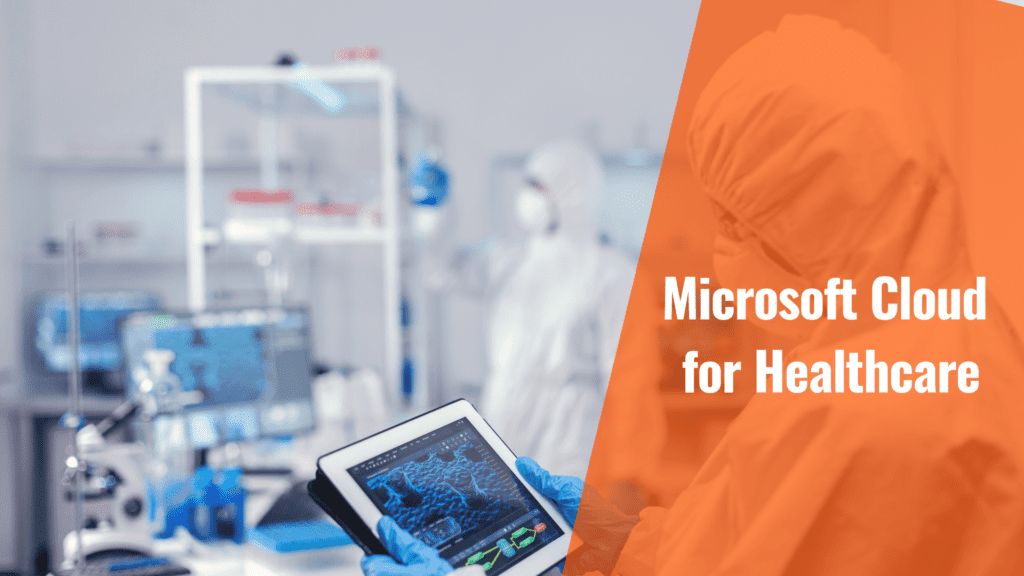As we know, the Covid-19 has a drastic impact on almost every industry including healthcare organizations, where the health care workers and healthcare teams are bearing the heaviest impact from this pandemic.
Moreover, the pandemic transformed the way healthcare organizations approach care team collaborations and interactions with the patient.
And this is the time when Health Organizations and hospitals need to step forward towards technology and tools to optimize the impact and switch to cloud computing.
Cloud computing and healthcare monitoring are increasingly being employed together as healthcare equipment.
That’s why Microsoft Cloud for Healthcare is launched to empower health organizations to deliver better experiences, better insights, and better care.
“The launching of Microsoft Healthcare Cloud is a great step forward, as it brings in a full continuum of care”. By Karen Priyadausini (Regional Business Leader for Healthcare, Microsoft Asia)
How Microsoft Cloud for Healthcare comes to life and benefits us?
1. Enhance Patient Engagement
● Enables personalized care
The Microsoft Cloud for Healthcare integrates the medical data history of a patient and his current medical requirements to deliver a personalized solution and segment patient’s data based on attributes related to health and interaction. Cloud computing in health care helps Healthcare organizations to outreach programs for each group and provide targeted material based on an individual’s profile and medical recorded data
● Patient access: Triage and Transfer
Patients can easily access their health data or an upcoming appointment by just logging into their portal. They can now interact with the health bot to perform triage and book a virtual appointment, consult with the doctors, and more using the Microsoft bot templates.
● 360° view of data
Microsoft Cloud gives a broad view of data to flow securely through every point of care and improve patient experiences and health outcomes.
2. Ensure better performance
Microsoft allows the doctors and healthcare workers to begin the day with the dashboard view of all prioritized patients’ needs and appointments.
Moreover, The Team members can now focus on the right plans at the right time that need adjustments and check the status of the care plan with interactive and actionable insights. The automated scheduling capabilities can route the right healthcare worker to the right patient based on their unique need.
This uses scheduling optimization capacity in Microsoft Dynamics Platform
3. Reduces expenditure spent on data storage
“App service reduces the data storage deployment costs by no less than a thousand percent.” Mike katchourine (Senior Director, Enterprise Integration Development)
Cloud computing saves you from buying costly storage equipment and systems that you need in the traditional method of storage of data and files. With the help of Microsoft healthcare cloud, we can minimize the capital paid for data storage and communication between the patient and doctors or between the healthcare workers.
4. Secure communication and messaging
Clinicians need tools to help them chat easily with the patient or other clinicians with extra security to protect the data. They may use mobile healthcare apps for communicating with patients.
With Microsoft Cloud for Healthcare, all the staff and patients can communicate on one platform with Microsoft’s secure messaging capabilities and know who is on the shift so that the person can be replaced by another and deliver timely care and efficient patient care with secure computing.
5. Digitalization of Hospitals
The health care industry has come a long way more than just Hospital Information System (HIS), Electronic Health Records (EHR) are more common nowadays.
With the advances in technology, the healthcare industry in all kinds of markets is becoming more digital, collaborative, patient-centric, and data-driven. In addition, now they can access data digitally at any time and anywhere.
6. Less workload
The health care industry has come a long way more than just Hospital Information System (HIS), Electronic Health Records (EHR) are more common nowadays.
Cloud computing in the Healthcare department reduced the workload on healthcare team members by scheduling all their appointment with the required patient itself by analyzing the stored medical history.
Now instead of directing consulting to the doctor, patients can chat with integrated Microsoft Bot to ask queries or information related to healthcare, and after that, unfortunately, if they are not satisfied with the bot service, then they can talk to the healthcare worker or book an appointment without actually talking to the healthcare members. This minimizes the average workload on doctors and ensures flexible workflow.
7. Encourage Virtual Healthcare facilities
With the virtual Healthcare facilities offered by Microsoft Cloud for Healthcare, it has become easy to address challenges like COVID – 19 extending the healthcare beyond the four walls of a hospital and promoting virtual visits. The technologies like virtual reality and augmented reality is already transforming the pharma industry. It ensures complete service to the patients, from booking an appointment to personalized care and medication prescribed by the doctor.
Bottom Line:
Being a technology enabler for the healthcare industry, ZiniosEdge is here to help you to establish a digital healthcare environment for your organization.

